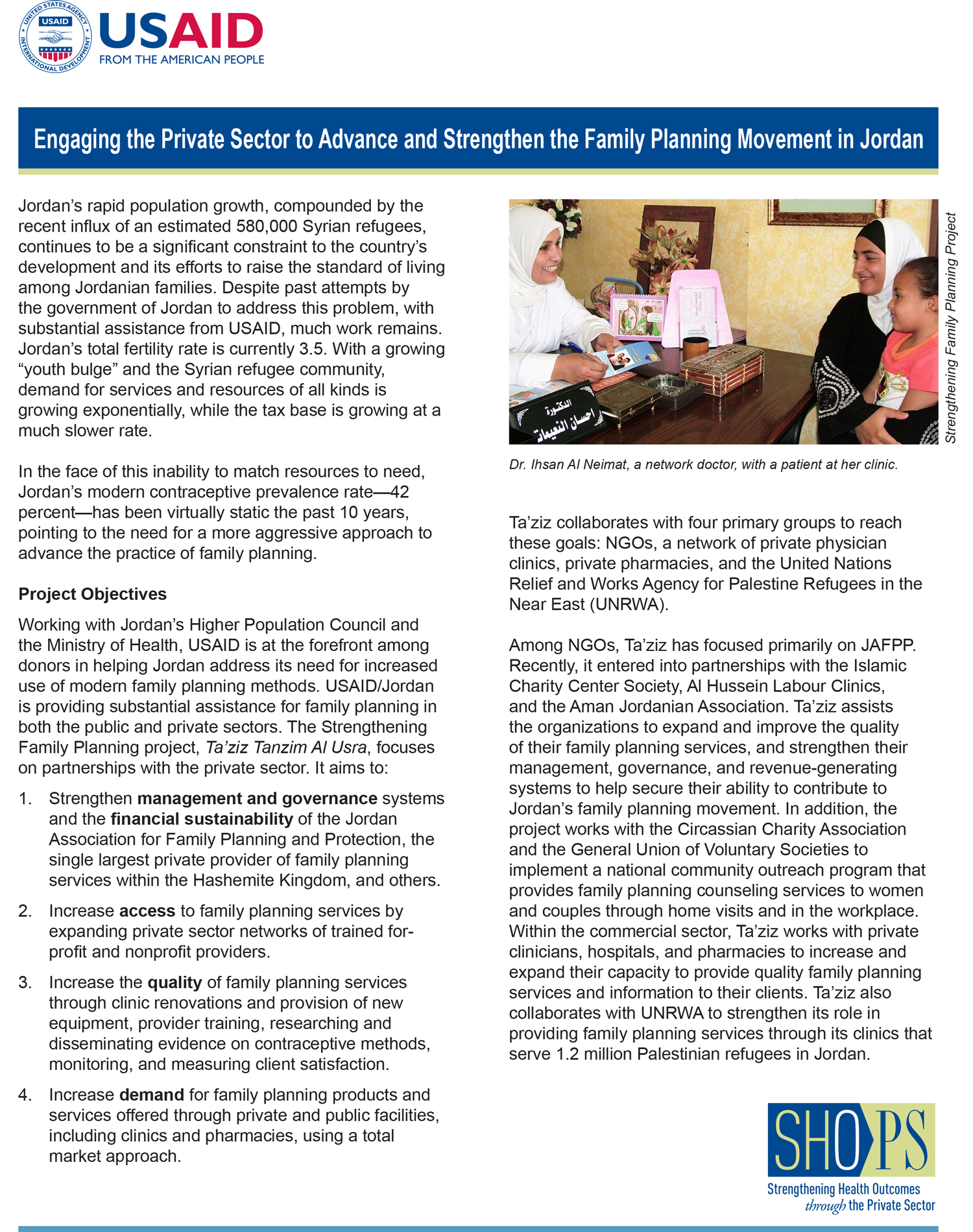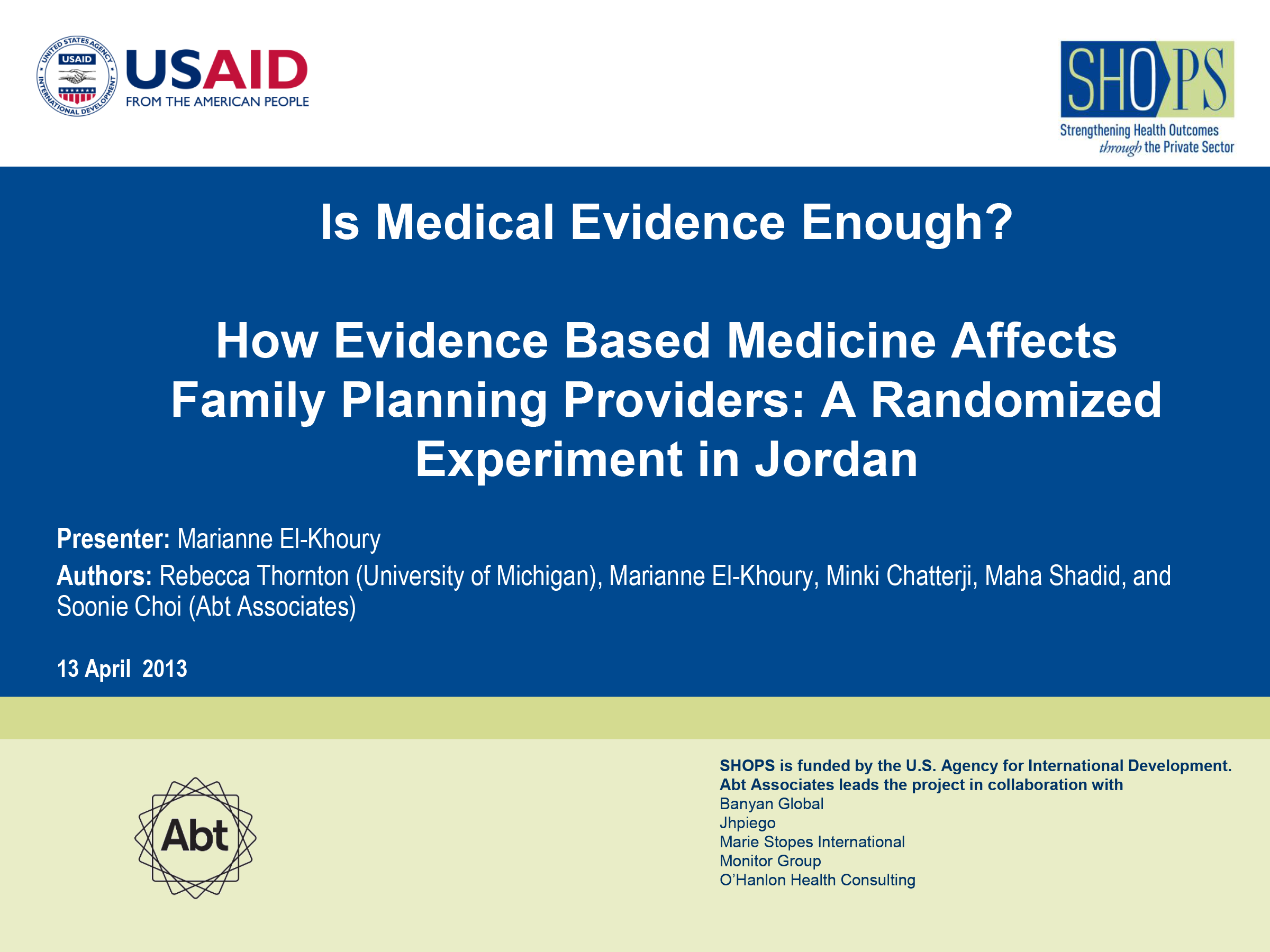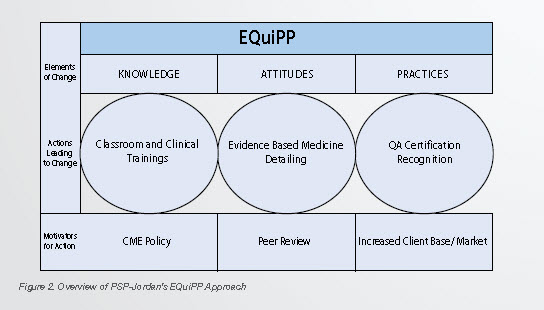
Resource Library
Engaging the Private Sector to Advance and Strengthen the Family Planning Movement in Jordan
A four-page overview of the initiatives implemented by SHOPS to increase the use of family planning services in Jordan through partnerships with the private sector. Includes expected program results and key milestones.
Resource Type : Brief
Country : Jordan
Year : 2014-05-14T00:00:00
Language : English
Project : SHOPS

Resource Library
How Evidence Based Medicine Affects Family Planning Providers: A Randomized Experiment in Jordan
This study examines the impact of an evidence-based medicine (EBM) intervention in Jordan that uses roundtable seminars discussing research evidence on DMPA to dispell providers' misconceptions regarding injectable hormonal contraceptives. The randomized study seeks to understand whether or not this intervention is effective in changing providers' knowledge about DMPA. The presentation was made by Marianne El-Khoury at the Population Association of America's annual meeting in April 2013.
Resource Type : Presentation
Country : Jordan
Year : 2013-07-05T00:00:00
Language : English
Project : SHOPS

Resource Library
Tanzania Zinc Case Study
This document is part of a series of fourteen case studies in eleven countries that have tried to scale up ORS and zinc. These case studies document both successful and unsuccesful programs and contribute to our understanding of efforts to deliver proven interventions for childhood diarrhea. They are relevant to the community of international agencies, policy makers, researchers, and donors. Countries included in the series are: Bangladesh, Guyana, India, Jordan, Madagascar, Malawi, Nepal, Senegal, Sierra Leone, Tanzania, and Trinidad and Tobago. In some cases a country may have two case studies, one on ORS and one on zinc.
Resource Type :
Country : Tanzania
Year : 2013-01-09T00:00:00
Language : English
Project : SHOPS

Resource Library

Strengthening Family Planning in Jordan
Dr. Maha Al Saheb, NGO services delivery manager of the SHOPS team in Jordan, provides the clinical and training skills necessary to improve the quality of family planning and reproductive health services at clinics run by the Jordanian Association for Family Planning and Protection and the United Nations Relief and Works Agency for Palestine Refugees in the Near East. She has nearly 30 years of clinical and community health work in the public and private sectors, and has advised USAID and the Ministry of Health in planning and executing monitoring and evaluation systems for projects.
In this video, Dr. Al Saheb discusses the work of the Strengthening Family Planning (Ta'ziz Tanzim Al Usra in Arabic) project in addressing Jordan's family planning challenges.
Resource Type : Video
Country : Jordan
Year : 2012-09-17T12:00:00
Language : English
Project : SHOPS

Resource Library
Violence Against Women Strategy
This report is the product of a consultancy visit for the Private Sector Project for Women’s Health that took place in Amman, Jordan from April 25 to May 28, 2006 and subsequent discussions with USAID/Amman.
The Scope of Work the consultants undertook included:
- Meeting with groups in Jordan currently active in VAW provision for assessment purposes
- Reviewing the relevant documents and national strategies on family protection
- Reviewing PSP’s current work with a view to finding ways in which to integrate VAW activities
- Recommending both a structure to implement VAW activities and ways in which to measure their impact.
The consultants read relevant VAW material pertaining to Jordan as well as visited a number of agencies working in VAW in the country to plan a strategy for PSP to address VAW. Included in the report is a general background of VAW in Jordan, information pertaining to PSP’s prior work in VAW as part of a pilot project with the Family Guidance and Awareness Center in Zarqa and a synthesis of information gleaned from organizations and governmental bodies working in VAW Jordan for the purpose of identifying particular opportunities for PSP. A draft report with recommendations for four proposed projects for PSP was discussed with USAID/Amman, and the agreed activities were reduced to three focus areas, included in the report.
Resource Type : Report
Country : Jordan
Year : 2006-05-22T00:00:00
Language : English
Project : SHOPS

Resource Library
Technical Assistance in Research, Monitoring and Evaluation
The Private Sector Project for Women’s Health (PSP-Jordan) is a five-year project funded by the United States Agency for International Development (USAID) with a mandate to improve the health of Jordanian women and families. Through a program of outreach visits, conducted by community health workers (CHWs), the project addresses contraceptive demand, knowledge of women’s health issues, and awareness of violence against women. The visits are orchestrated through a partnership with the Circassian Charity Association (CCA) and the General Union of Voluntary Societies (GUVS).
Karen Finnegan traveled to Amman Jordan from January 24 to February 6 2009 under a scope of work with the following objectives:
- Discuss findings of analysis of outreach data with PSP staff and partnering organizations to determine client profile for future visits
- Develop visitation guidelines for FP outreach visits
- Provide recommendations for upgrading the outreach program’s data collection, recording, and reporting system
- Work with local PSP staff to determine the feasibility of the suggested technical upgrade
- Review PSP’s existing Monitoring and Evaluation system, identifying further needs for data analysis and documentation of PSP outcomes and potential impact
This report presents key finding, recommendations, and next steps.
Resource Type : Report
Country : Jordan
Year : 2009-01-15T00:00:00
Language : English
Project : SHOPS

Resource Library
Outreach NGO Sustainability
The Private Sector Project for Women’s Health works to improve the health of women in Jordan, especially for reproductive health and family planning, breast cancer and domestic violence. Nancy Natilson visited Amman, Jordan from March 15 – 28, 2008 to conduct a needs assessment and business planning workshop for PSP-Jordan’s two outreach partners, Circassian Charity Association (CCA) and General Union of Voluntary Societies (GUVS), in order to build their capacity to improve sustainability. The consultant spent several days with the senior staff of each NGO to identify institutional strengths and weaknesses and to develop recommendations to improve the sustainability of the projects.
Based on the assessment, the consultant also recommends longer term sustainability initiatives, which include attempting to diversify revenue sources, finding strategic partners, increasing operating efficiencies and addressing other weaknesses that were uncovered in the assessment and the workshop. Recommendations to address these weaknesses include:
- On-going financial management: Implement the discipline of monthly financial reviews complete with a variance analysis comparing actual figures with budgeted figures, focusing on operating efficiencies, and monitoring of cash flow.
- Governance: Develop an engaged Board that is involved in strategic decisions and to whom the Project Director reports; if the existing NGO structure does not provide this kind of oversight, explore the possibility of creating an advisory board.
- Performance review: Formalize the process with appropriate formats and policies and procedures at all levels.
- Succession planning: Increase management depth and invest in training deputy directors and delegating responsibilities.
Resource Type : Report
Country : Jordan
Year : 2008-04-15T00:00:00
Language : English
Project : SHOPS

Resource Library
Documentation of Project Methodology and Success Stories
The Private Sector Project for Women’s Health works to improve the health of women in Jordan, especially for reproductive health and family planning, breast cancer and domestic violence. It does so by working to improve the quality of private health care provision available by improving the skills and knowledge base of physicians, improving public understanding of modern contraceptives, breast cancer and gender based violence, and reaching out to women in their homes to educate them about reproductive health and gender based violence issues and providing referrals to physicians and cancer centers. The project’s activities have successfully reached private sector physicians and women of reproductive age, and have created some replicable models. Short-term assistance was needed to pull together documentation of these project successes. This report documents this assistance.
Resource Type : Report
Country : Jordan
Year : 2012-03-10T00:00:00
Language : English
Project : SHOPS

Resource Library
Enhancing Quality in Private Providers
This Technical Brief presents a summary from the Private Sector Project for Women’s Health (PSP) in Jordan, who have developed an integrated approach to improve the quality of family planning and reproductive health care services offered and it has successfully changed private providers’ behaviors. The EQuIPP approach aims to improve three key elements of behavior change – 1) Knowledge, 2) Attitudes and 3) Practices – through classroom and clinical training, the use of evidence based medicine and detailing, and a quality assurance certification process. Providers are encouraged to participate in the activities in or-der to get Continuing Medical Education (CME) credits, to develop networks and to get peer input into their practices, and to receive referrals and additional publicity to increase their clientele.
Resource Type : Brief
Country : Jordan
Year : 2011-01-15T00:00:00
Language : English
Project : SHOPS

Resource Library
Private Provider Quality Assurance Mystery Client Study Report
To improve the quality of private sector services, the Private Sector Project for Women’s Health focuses on provider training and education, as well as a quality assurance certification program. In July 2009, PSP Jordan implemented a mystery client study to assess the long-term impact of Quality Assurance certification on the clinical practices of private providers. The mystery client study was designed to observe provider interaction with patients, assess medical appropriateness of prescribed family planning methods, and document the available resources in clinics.
The mystery client study found that providers who participate in the quality certification for Family Planning with Specific Personal and Medical conditions provide high-quality, comprehensive counseling for patients who present with complicated medical scenarios. Although there are some gaps in counseling and infection control, mystery clients are mostly happy with the services offered by trained providers.
The results of this evaluation indicate that the program can work to reinforce specific messages and provide ongoing support to private providers after the completion of the certification process. A debriefing session will be held with participating providers to discuss key findings, areas for improvement, and mystery client feedback.
Resource Type : Report
Country : Jordan
Year : 2010-02-15T00:00:00
Language : English
Project : SHOPS
Pagination
- Previous page
- Page 4
- Next page






